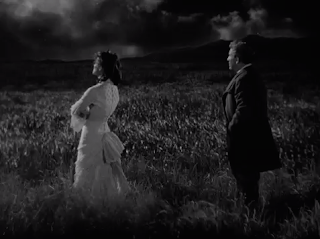It's a historic year for Hollywood, but not because of the movies. This is the year that saw the beginning of the Hollywood Blacklist. Earlier efforts to rout out Communist filmmakers were unsuccessful and openly mocked. Hell, Russia was our ally during the War just two years earlier, with friendly relations and pro-Soviet feelings encouraged. But that was then, and as Best Picture nominee Crossfire put it, "We're too used to fighting, but we just don't know what to fight. ...A whole lot of hate and fight that doesn't know where to go." By October, the House Un-American Activities Committee was holding hearings; by November, the Hollywood Ten were cited for contempt of Congress for refusing to cooperate with the line of questioning; the next day, 48 Hollywood executives released the Waldorf Statement, assuring the public that no Communist would find work within their hallowed gates. (You can get a fuller account of these events, as well as their effect on individuals, from the 2015 season of Karina Longworth's invaluable podcast, You Must Remember This.)
On this blog, we focus more on the individual films, though to pretend that events outside did not influence their reception is goofy. Pre-blacklist, we find a large output of socially-conscience films dealing with American society post-World War II. Some films are almost propagandistic in their praise of government bodies and officials, sure, but many deal with veteran malaise, housing shortages or prejudice. These themes enter films noir, dramas, comedies, even holiday treats. We'll be looking at these and more over the coming weeks.
Here are the first ten movies. My reactions are honest, and while I've tried to keep in mind the times, in the end, I like what I like.
T-Men
dir: Anthony Mann
dir: Anthony Mann
scr: John C. Higgins, suggested by a story by Virginia Kellogg
Oscar Nominee: Best Sound Recording
Vincent Price, Uncle Remus, an angel, and so much more - after the jump!
Moss Rose
dir: Gregory Ratoff
scr: Jules Furthman, adaptation by Niven Busch, based on the novel by Joseph Shearing
Song of the South
dir: Harve Foster (live action), Wilfred Jackson (animation)
scr: Dalton Reymond and Morton Grant and Maurice Rapf, story by Reymond, cartoon story by Bill Peet and Ralph Wright and George (Vernon) Stallings, based on stories by Joel Chandler Harris
Oscar Winner: Best Original Song ("Zip-A-Dee-Doo-Dah")
Oscar Nominee: Best Musical Score
Honorary Oscar: Awarded to James Baskett "for his able and heart-warming characterization of Uncle Remus, friend and story teller to the children of the world"
dir: Elia Kazan
scr: Marguerite Roberts and Vincent Lawrence, based on the novel by Conrad Richter
dir: Norman Z. MacLeod
scr: Ken Englund and Everett Freeman, based on the short story by James Thurber
Mild-mannered putz with wild fantasy life is thrust into real-life adventure. Danny Kaye is a charmer, a cutie, and his spastic neurotic routine somehow sells even the most frustrating turns. Fine sets, costumes, cinematography. Oddly truncated ending.
dir: Michael Curtiz
scr: Donald Ogden Stewart, based on the play by Howard Lindsay & Russel Crouse and the memoir by Clarence Day
Oscar Nominee: Best Actor (William Powell), Best Cinematography (Color), Best Art Direction-Set Decoration (Color), Best Dramatic or Comedy Score
Episodic domestic comedy about a tyrannical patriarch and fam in 1880 New York. William Powell and Irene Dunne are a g.d. delight: he's forcefully blunt, she's quietly manipulative, their chemistry is immediate. Quietly subversive in critiques of organized religion.
dir: Elia Kazan
scr: Richard Murphy, based on a Reader's Digest article by Fulton Oursler (aka Anthony Abbot)
Oscar Nominee: Best Screenplay
Oscar Nominee: Best Screenplay
dir: Edmund Goulding
scr: Jules Furthman, based on the novel by William Lindsay Gresham
dir: Jacques Tourneur
scr: Daniel Mainwaring (aka Geoffrey Homes), based on his novel Build My Gallows High
The past catches up with gumshoe turned gas station owner Jeff Bailey. Boring, repetitive, with frequent and avoidable double-crosses that make you wonder if everyone involved is a moron. Jane Greer's a fine femme fatale, villainous Kirk Douglas a treat. Otherwise? Meh.
dir: Henry Koster
scr: Robert E. Sherwood and Leonardo Bercovici, based on the novel by Robert Nathan
Oscar Winner: Best Sound Recording
Oscar Nominee: Best Picture, Best Director, Best Film Editing, Best Dramatic or Comedy Score
Angel comes to Earth to help a bishop and his wife at Christmastime. Quietly wise, with sincere warmth and spiritual renewal that avoids mawkishness. A score that is, dare I say, divine. Scenes that brought me to tears. It's magical and I adore it.
The Best of the Ten: The Bishop's Wife, Nightmare Alley
The Worst of the Ten: Out of the Past











No comments:
Post a Comment